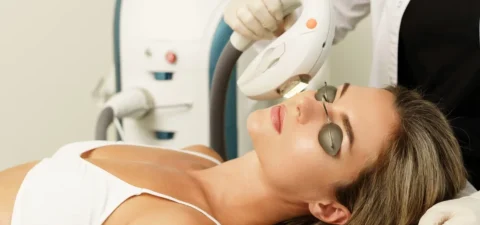All content in this blog is for informational purposes only. It is not medical or legal advice. Please consult with a lawyer or a medical professional.
Paramedical estheticians are skin care specialists, providing skin care to patients and working with other health care professionals. They usually work in the medical and cosmetic industries.
So what is a paramedical esthetician? A paramedical esthetician is a healthcare professional that is trained to assist dermatologists, surgeons, and other doctors in treating skin conditions. They are professionals with licenses and are equipped with dermatological knowledge, communication skills, organizational skills, and interpersonal skills.
What Do Paramedical Estheticians Do?
Depending on the specialization of the medical facility, a paramedical esthetician’s job description might differ. Paramedical estheticians work with dermatologists and surgeons when addressing a patient’s skin problem. Their assistance is needed before and after surgery.
Here are some tasks of a paramedical esthetician:
- Massaging the patient’s skin
- Shaving the skin before surgery
- Exfoliating the patient’s skin
- Performing anti-aging procedures
- Instructing the client on how to care for the skin
- Giving medical advice about skin health
- Keeping the equipment clean and sterile
- Checking the client’s file and medical history
- Communicating through telephone and email
- Giving administrative support when needed.
How Do You Become a Paramedical Esthetician?
Having a high school diploma or its equivalent is the first step toward becoming a paramedical esthetician. This diploma is a requirement to be admitted into a paramedical esthetician program, which can be a certification or diploma program and can last from six to twelve months. These programs are offered by medical esthetician schools such as the Aveda Institute.
You can also try aiming for an associate degree, which usually takes two years of study. Courses offered in these programs include esthetics, dermatology, facial treatments, plastic surgery, skin care treatment, and camouflage makeup techniques. Other programs include corrective makeup application, waxing, and sanitation of equipment.
In order to practice the profession, a paramedical esthetician must get an esthetician license. The licensure examination can be a written exam, a practical exam, or a hybrid of both. Different states have different requirements regarding licensing.
Most states require the examination from the National Interstate Council of State Boards of Cosmetology. This examination covers different skin care procedures. This particular exam can administer the written part of the exam through a computer.
After becoming a licensed esthetician, most paramedical estheticians first gain experience as makeup consultants, nail technicians, or estheticians. These entry-level positions are great for practicing skin care applications.
In these positions, medical estheticians have an opportunity to develop soft skills such as communicating with co-workers, building up patience when dealing with customers, practicing compassion towards clients, and writing up reports. Estheticians usually work at cosmetic shops, makeup counters, salons, medical spas and massage parlors.
What Skills Do Paramedical Estheticians Possess?
Paramedical estheticians offer different skill sets depending on their place of employment and educational background. Here are the common skills a paramedical esthetician should have.
1) Dermatological Knowledge
Paramedical estheticians are the ones that provide medical esthetics and make sure that their patients have healthy skin. They come equipped with a deep background in esthetics and basic dermatological knowledge from their program. The depth of their knowledge is dependent on whether they took a certification course or a degree course.
Their knowledge includes common skin damage, information about the aging process, anatomy, bacteriology, use of esthetician devices and equipment, cleaning practices for the skin, and cosmetic applications.
Most paramedical estheticians gain advanced esthetics and specialist knowledge when they start working in the medical field. They can gain specialized knowledge in treating burns, acne, psoriasis, and eczema by observing master estheticians, doctors, surgeons, and nurses.
For example, a paramedical esthetician can gain specialist knowledge about burns when working in a burn recovery center. Others gain specialist knowledge through advanced training programs.
2) Interpersonal Skills
Paramedical estheticians are also equipped with interpersonal skills. The clients they work with can feel anxious about their skin treatment; they can also have trauma because of what they experienced which leads to skin problems.
Paramedical estheticians are expected to use interpersonal skills to give comfort and reassurance to the client. They should have compassion and patience while applying cosmetics and teaching clients proper skin care.
3) Communication Skills
Communication skills are vital for any paramedical esthetician. They need to master communication so they can effectively teach their clients proper aftercare treatment after surgery. They should be able to make their client understand how to apply ointments and what possible side effects they may experience.
They also need to communicate with their colleagues as they assist surgeons and doctors during surgeries. They may also be requested to take notes on patients’ symptoms for the doctor or nurse’s reference and also take on administrative tasks involving written communication skills such as writing emails and reports.
4) Organizational Skills
While performing administrative tasks, paramedical estheticians display their organizational skills. They should be able to handle tasks such as updating a client’s contact information, retrieving patients’ surgical history, filing reports, and registering new clients.
They sometimes are also assigned to scheduling clients’ appointments. They are also expected to organize their inventory of skin products so that anyone in their facility can access the products.
How Much Do Paramedical Estheticians Make?
Paramedical esthetician is a profession that is projected to have a higher demand in the coming years. The esthetician career is one of the jobs with the highest demand. Currently, estheticians, including paramedical estheticians, have an average annual salary of $46,867.
Those who work as skin care specialists are reported to have an annual salary of $62,540 or more. While a medical esthetician career can have a higher salary. Those who are practicing their professions in a clinic have salaries of around $34,090. Entry-level salaries typically range from $25,000 to $35,000. Paramedical estheticians’ salaries depend on their skills, experience, and knowledge about a variety of skin-related procedures.
Comprehensive Training Modules at FACE Med Store
Paramedical estheticians work with a medical professional like a dermatologist and a surgeon when addressing a client’s skin problem, assisting them before and after surgery. Their skills include dermatological knowledge, interpersonal skills, communication skills, and organizational skills.
FACE Med Store offers a variety of comprehensive training modules that will surely equip you with the necessary knowledge and skills for becoming a paramedical esthetician. We also have advanced training modules to level up your knowledge and keep you educated about the current technologies and techniques in the field. Browse our catalog today to learn more about the comprehensive training modules that we offer.






